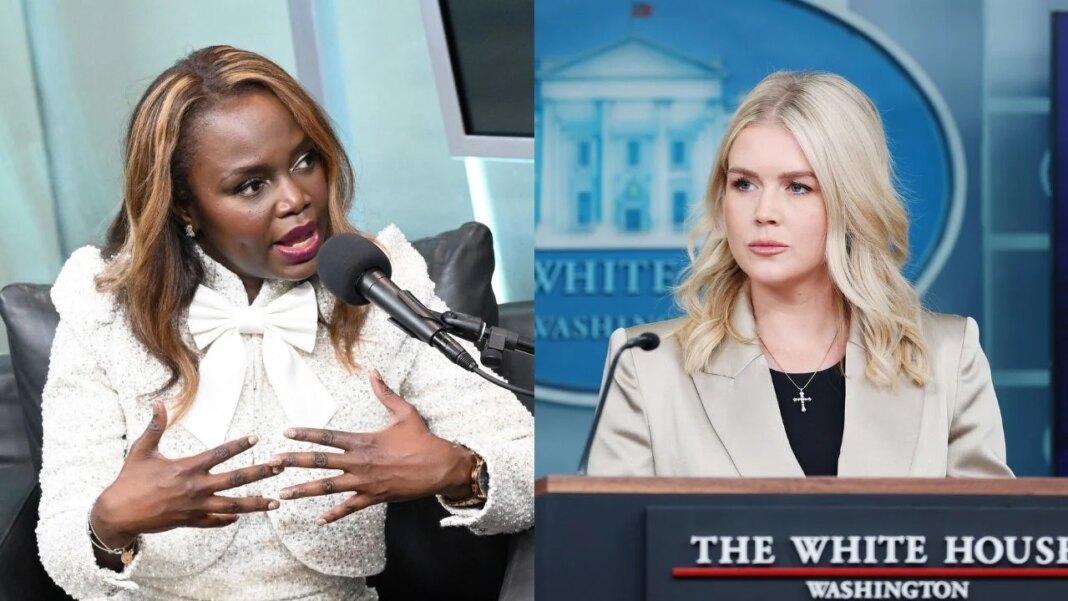The Tensions Between Former and Current White House Press Secretaries
The political landscape in the United States often mirrors a dramatic stage, where personalities and words play pivotal roles. Recently, Karine Jean-Pierre, former White House press secretary, addressed the increasingly contentious nature of political discourse as she reacted to the remarks of her successor, Karoline Leavitt. Their divergent approaches exemplify broader issues within the political atmosphere today.
Jean-Pierre’s Insights on Current Political Rhetoric
In a recent appearance on “The View,” Jean-Pierre openly criticized Leavitt’s comments about the Democratic Party, labeling them “deplorable.” Leavitt’s controversial remarks included framing Democrats in disparaging terms, which Jean-Pierre found alarming. Here was a seasoned press secretary who had navigated the complexities of communication on behalf of the Biden administration, now pointing out how such rhetoric undermines the very fabric of political discourse.
The Importance of Accountability in Media
Jean-Pierre insisted that the role of a White House press secretary extends beyond mere public relations; it embodies a commitment to the American populace. “They work for the American people,” she emphasized, reinforcing that the purpose of the position is to foster dialogue and transparency rather than engage in “online trolling.” Her remarks remind us that political communication should encourage unity, rather than division.
Respect for the Freedom of the Press
During the segment, Jean-Pierre articulated a powerful message about the freedom of the press. She stressed that a respectful relationship with the media is vital for democracy. The back-and-forth in press briefings serves as a demonstration of this principle, where accountability and communication go hand in hand. This perspective sheds light on the responsibilities that press secretaries hold—not just to facilitate information flow, but to uphold democratic values.
A Historical Perspective on Representation
Jean-Pierre made history as the first Black and openly LGBTQ press secretary, a milestone that adds weight to her criticism of the current administration’s handling of media relations. Her insights are not only shaped by her professional experience but also by her unique position within the political sphere. Her tenure from May 2022 until January 2025 positions her as a significant figure in contemporary politics, offering a nuanced understanding of representation and accountability.
The Youthful Approach of Karoline Leavitt
Taking over at the age of 27, Karoline Leavitt is one of the youngest press secretaries in U.S. history. However, her approach has attracted scrutiny, particularly due to her combative style and unorthodox methods. Critics argue that such tactics contribute to the heightened partisanship in today’s political climate. Jean-Pierre’s observations serve as a stark contrast, emphasizing that a respectful and dignified approach is essential, regardless of the nature of the political environment.
The Role of Unity in Political Discourse
Jean-Pierre’s understanding of the press secretary role goes beyond individual interactions. She sees it as imperative for fostering unity among citizens. By emphasizing that the role should address all Americans, she calls for a return to civility and respect in political dialogues. This perspective starkly contrasts the divisive language that has cropped up increasingly in recent political exchanges.
The Legacy of Communication Styles
As the political stage shifts, the communication styles of leaders like Jean-Pierre and Leavitt will likely continue to shape public perceptions. Jean-Pierre’s emphasis on respect and accountability presents a model for future press secretaries. On the other hand, Leavitt’s unconventional style may resonate with specific voter bases, but at the cost of widespread approval.
Through Jean-Pierre’s critique, it becomes apparent that the dynamics of communication in Washington are more than just tactics; they embody the values that the nation stands for. As both figures navigate their respective paths, their contrasting approaches will directly impact how Americans engage with their government and each other in the coming years.



